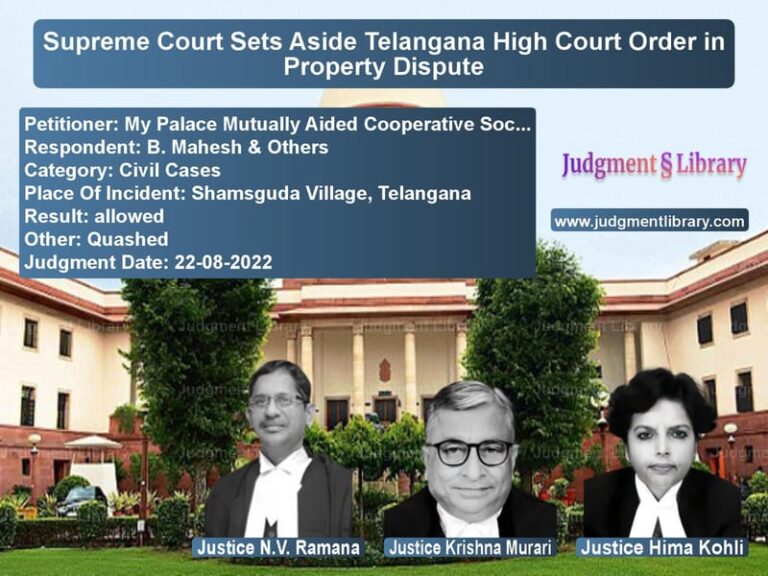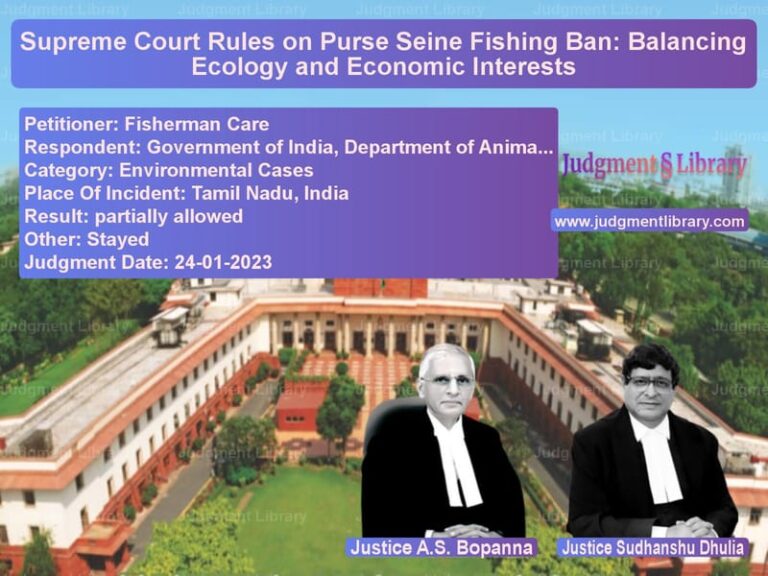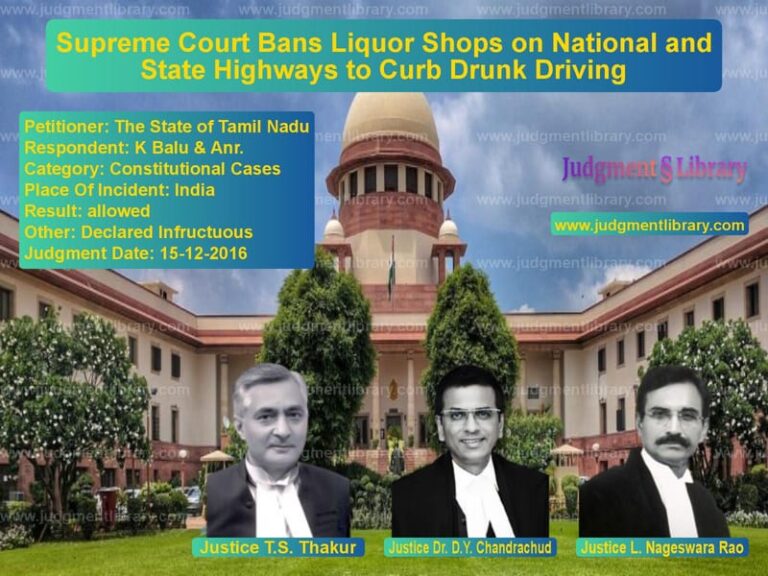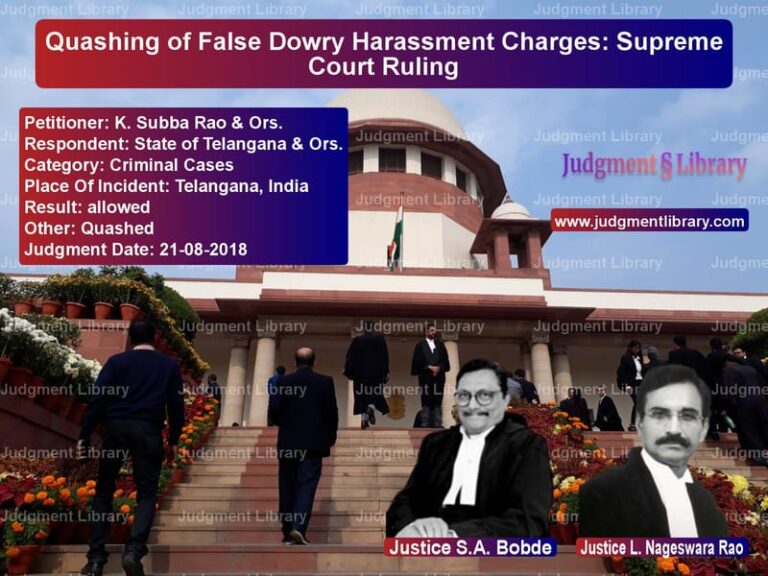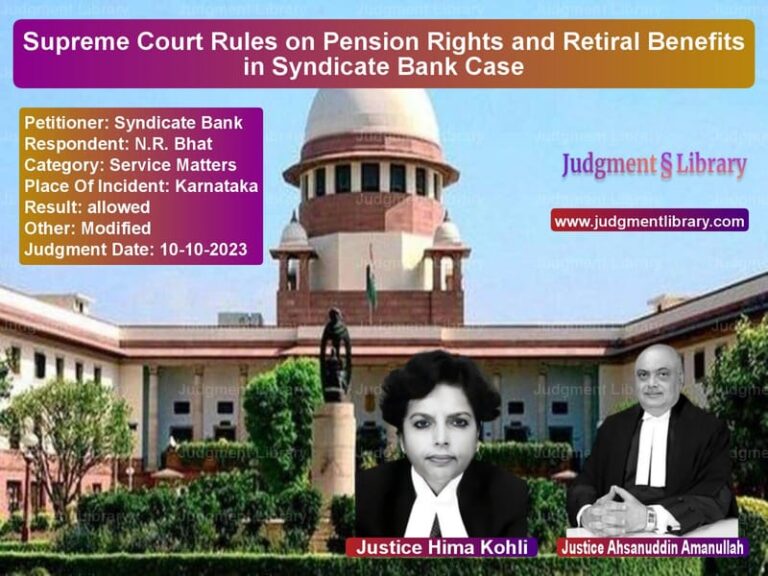Supreme Court Reverses Conviction in Rajasthan Murder Case Due to Unreliable Witnesses
The Supreme Court of India, in the case Shahid Khan vs. State of Rajasthan, dealt with the murder conviction of the appellants who were initially sentenced for the brutal killing of Ashok Kumar in Jhalawar. The Court examined the evidence and the testimonies of key witnesses, specifically those who claimed to have seen the crime take place. After reviewing the facts and considering the credibility of the witnesses, the Supreme Court decided to reverse the convictions, citing doubts over the reliability of the witnesses.
Background of the Case
The dispute arose after Ashok Kumar was murdered on January 22, 2001, in Jhalawar. The complainant, Anil Kumar Jain (PW 19), reported that Ashok Kumar had been attacked by a group of men, including the appellants. He identified the accused as being responsible for the murder and alleged that the attack was driven by a prior conflict between the victim and the accused related to the murder of Kallu. The accused used sharp weapons such as knives and daggers to inflict fatal injuries on the victim.
The Sessions Court convicted the appellants under sections 147, 148, 302/149, and 397 of the Indian Penal Code (IPC). However, the High Court of Rajasthan dismissed the appeal, which led to the present case being brought before the Supreme Court.
Petitioner’s (State of Rajasthan) Arguments:
- The State argued that the conviction of the appellants was well-founded, relying on the testimonies of key witnesses, including PW 25 Mirza Majid Beg and PW 24 Mohamed Shakir, who claimed to have witnessed the crime.
- The State contended that the evidence presented by these witnesses corroborated the charge of murder, and the appellants should be held accountable for their actions.
- The prosecution argued that the appellants’ premeditation and use of weapons during the attack justified the conviction under Section 302 (murder) of the IPC.
Respondent’s (Shahid Khan and Others) Arguments:
- The defense raised several points challenging the reliability of the witnesses. Senior Advocate Sushil Kumar Jain, representing the appellants, argued that the testimonies of Mirza Majid Beg (PW 25) and Mohamed Shakir (PW 24) were unreliable due to several inconsistencies.
- The defense pointed out that the witnesses did not immediately report the crime or assist in taking the victim to the hospital. Their delayed statements raised doubts about their presence at the scene.
- Furthermore, it was argued that the witnesses had personal motives for implicating the appellants, particularly due to previous incidents involving the accused and the witnesses’ family members.
Supreme Court’s Judgment:
- The Supreme Court found the testimonies of the key witnesses, PW 25 Mirza Majid Beg and PW 24 Mohamed Shakir, to be unreliable. It noted that their statements were recorded three days after the incident, without a satisfactory explanation for the delay.
- The Court highlighted that no other independent corroborative evidence was available to support the witnesses’ claims. The Court stated, “In this case, the delay in recording statements and the absence of immediate reporting to the police raises serious doubts about the credibility of the witnesses.”
- Moreover, the Court found it implausible that the witnesses would leave the scene of the crime without helping the victim or informing the authorities. The Court observed that their actions seemed inconsistent with what would be expected of responsible witnesses in such a situation.
- In light of these issues, the Supreme Court concluded that the prosecution had failed to prove its case beyond a reasonable doubt, and the conviction was unsustainable.
- The Court ordered the acquittal of the appellants and set aside the convictions and sentences imposed by the Sessions Court and confirmed by the High Court.
Key Takeaways
- The case underscores the importance of reliable and consistent eyewitness testimony in criminal trials, particularly in murder cases where the penalty is severe.
- The judgment highlights the scrutiny applied to witness credibility, especially in cases involving delays in recording statements and inconsistent behavior following the crime.
- The ruling also emphasizes that the mere presence of a witness is not sufficient to convict; their testimony must be corroborated by other evidence and consistent with the facts of the case.
The judgment was delivered by Justice Jagdish Singh Khehar and Justice C. Nagappan on March 2, 2016.
This decision reinforces the principle that justice can only be served when the evidence is credible and reliable, especially in criminal cases where the consequences are irreversible.
Don’t miss out on the full details! Download the complete judgment in PDF format below and gain valuable insights instantly!
Download Judgment: State of Rajasthan vs Shahid Khan and Othe Supreme Court of India Judgment Dated 02-03-2016-1741853823680.pdf
Direct Downlaod Judgment: Direct downlaod this Judgment
See all petitions in Murder Cases
See all petitions in Attempt to Murder Cases
See all petitions in Fraud and Forgery
See all petitions in Judgment by Jagdish Singh Khehar
See all petitions in Judgment by C. Nagappan
See all petitions in allowed
See all petitions in supreme court of India judgments March 2016
See all petitions in 2016 judgments
See all posts in Criminal Cases Category
See all allowed petitions in Criminal Cases Category
See all Dismissed petitions in Criminal Cases Category
See all partially allowed petitions in Criminal Cases Category


